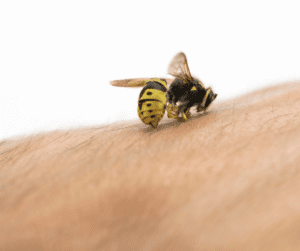With the official start of summer just around the corner, everyone is looking forward to outdoor activities. In fact, many people are already starting to enjoy trips to the beach, hikes along the trail, and outdoor gatherings with friends.
While enjoying those activities, you might start to notice a faint buzzing in the air. Dashing from flower to flower, bees are busy pollinating the world around us. Although bees are essential—and typically don’t cause problems—there is always a chance of being stung. If you accidentally come across a hidden beehive or swat at the wrong insect, you can find yourself with a painful sting.
Fortunately, most bee stings can be treated at home. This article covers a few of the many ways how to treat a bee sting as well as when you might need to seek out professional care.
What to Do After a Bee Sting
Getting stung by a bee is a startling experience. After it happens, your first instinct might be to swat at it. However, doing so will only agitate the bee (or bees) further and may lead to more stings.
After getting stung, you should quickly and calmly move away from the area. This makes it less likely that you’ll be stung by another bee. If bees start to chase you, cover your face while moving to a safe location. The best place to be is an indoor area or the inside of a car.
How to Treat a Bee Sting at Home

Getting stung by a bee isn’t pleasant. Unfortunately, the pain of the sting often lasts for several hours. Most people experience a sharp, burning sensation at the site of the sting. A red, swollen welt is also common.
Since most bee stings only include local symptoms, treating them at home is fairly easy. The first thing to do is wash the area with soap and warm water. Try not to massage or itch the area as doing so can make the inflammation worse. After washing the site of the sting, cover it with a cold compress or an ice pack wrapped in a towel. Most of the time, the pain from a bee sting will start to improve within a few hours after treating it in this way.
For more severe stings, it may be helpful to take an over-the-counter medication like ibuprofen (Advil/Motrin) or acetaminophen (Tylenol). If the swelling around the site doesn’t improve, applying a paste made of baking soda and water may help. Most moderate stings start to improve in five to ten days.
When to Seek Medical Care for a Bee Sting
Unfortunately, some bee stings are more severe than others. In most cases, this is because the person who got stung has an allergy to the venom injected by the bee. Allergic reactions to a bee sting may be moderate, with intense pain and swelling that lasts several days. They may also be life-threatening.
For those with a severe allergy, a bee sting can trigger anaphylaxis. This requires immediate medical care and can be fatal if left untreated. Those with signs of an allergic reaction to a bee sting should immediately seek medical care. Things to look for include:
- Hives
- Tightening of the throat
- Trouble breathing
- Dizziness or fainting
- Swelling of the mouth and tongue
- Weak or rapid pulse
- Flushed or pale skin
- Nausea, vomiting, or diarrhea
How to Prevent Bee Stings
Although treating most bee stings at home is easy, avoiding a sting in the first place is even better. While enjoying outdoor activities this summer, there are several things you can do to prevent bee stings. Perhaps the most important is avoiding areas with lots of flowers and trees that are producing fruit. Since bees are busy pollinating these plants, you’re more likely to have a painful encounter with one. Another way to prevent bee stings is to avoid using strong perfumes and scented lotions. Bees are attracted to the sweet smells, making it more likely for you to be stung.
Zip Clinic Urgent Care is Here to Help
If you are stung by a bee this summer and aren’t able to take care of your symptoms at home, Zip Clinic is ready to help. Our friendly and skilled team of providers will assess the area of the sting and your symptoms to determine the best treatment for how to treat your bee sting. We can prescribe medications to decrease inflammation, pain, and itching after you’re stung by a bee. In more severe cases, we can help manage symptoms related to an allergy or refer you to the emergency room for more advanced care if needed.
Zip Clinic is an in-network provider for most major insurance plans, meaning you can be seen for the cost of your co-pay and deductible. All of our locations also accept Medicare, Medicaid, and Tricare. Veterans Administration beneficiaries are also welcome. To find out more about our services, locations, hours, and more, visit https://zipclinic.com/.



Recent Comments